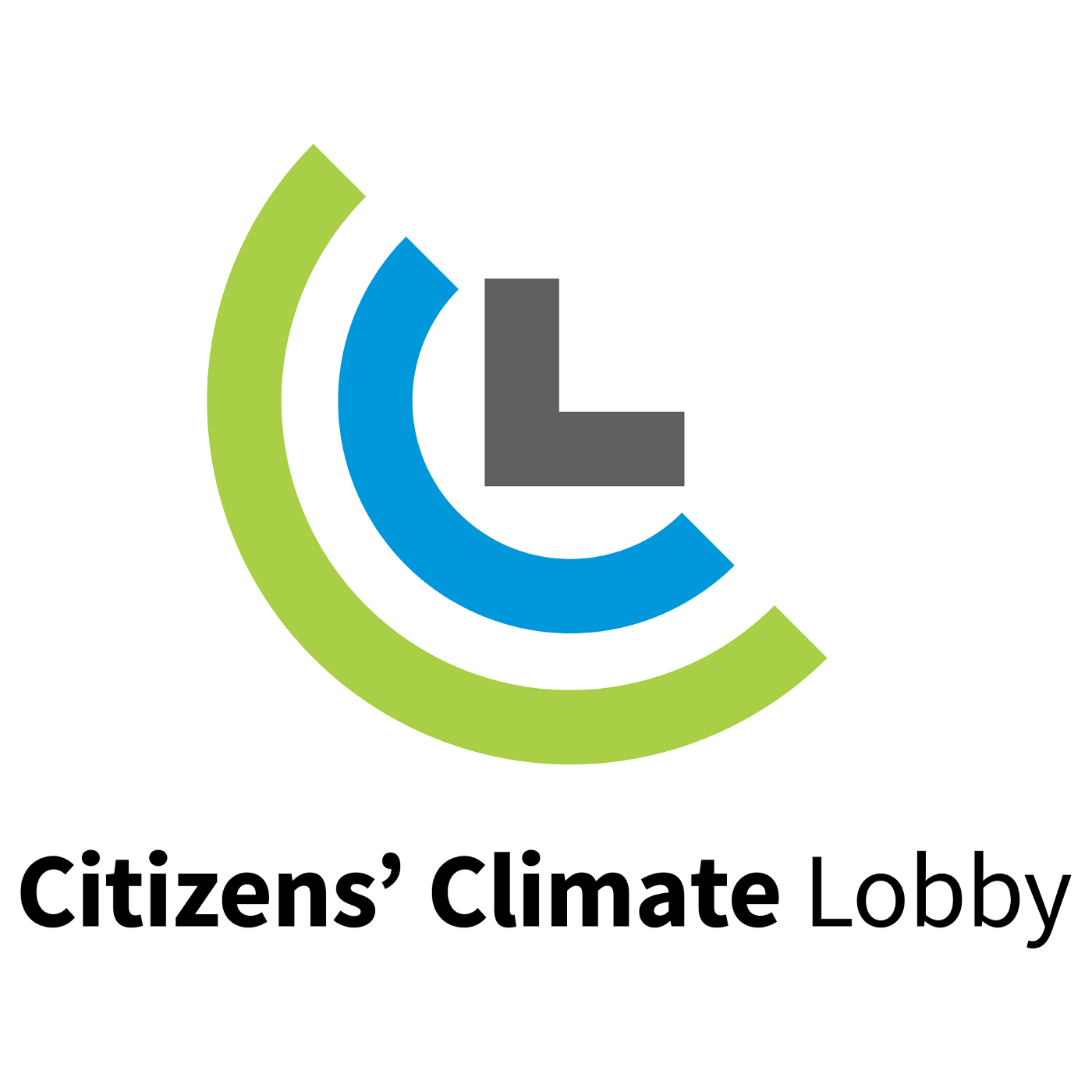Episodes
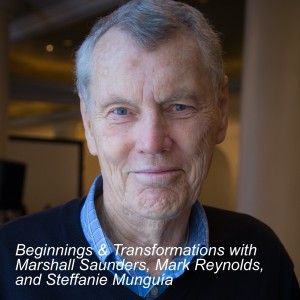
Thursday Jun 23, 2022
Thursday Jun 23, 2022
We are celebrating the sixth anniversary of Citizens Climate Radio, and a big theme you will hear in this episode is about break-throughs and transformations. From the very beginning, Citizens Climate Lobby’s mission has been to create the political will for a livable world by enabling individual breakthroughs in the exercise of personal and political power. That was definitely the theme in the very first interviews Citizens Climate Radio’s host, Peterson Toscano, conducted with Marshall Saunders, founder of CCL, and Mark Reynolds, the organization’s first executive director.
Peterson decided to revisit these interviews, remaster them, and share them with you. Marshall and Mark’s personal stories of transformation are inspiring and at times hilarious, especially when they talk about the first tentative and even ridiculous steps they took to start the organization. Their belief in the power of everyday people doing extraordinary things will move you. In fact, you may want to have some tissues nearby as you listen to Marshall and Mark share their stories, and the story of Citizens Climate Lobby’s beginnings.
Madeleine Para, CCL’s current executive director was also featured in that first episode. You will hear her original vision for this podcast.
From the recent past we bring the story forward to today. You will meet one of the newest Citizen’s Climate staff members. Steffanie Munguía is a PhD student researching Coastal Wetlands Management in the Caribbean, her first home. She gives us an update of the many ways the organization has changed over the years all while staying faithful to CCL’s core values of Optimism, Integrity, Relationships, Personal Power, Diversity, and a constant commitment to bipartisanism. These are the values that draw more and more college, high school, and middle school aged volunteers into the organization.
The Art House
Jodi Heights is a singer/songwriter. In the sea of singer-songwriters, Jodi stands out. Not only does she have a classically honed technique that captures a Broadway style in her voice, and contemporary rock in her piano playing, she also writes brilliant lyrics that dive deep into everyday life. Her songs can be playful and heartbreaking.
Recently she was moved to write a song about our world, which is being rocked by the impacts of climate change. In The Iceberg she imagines an alien classroom in the future looking back to the history of earthlings and the lessons they can draw from human error. Jodi tells us about The Iceberg and then performs it for us.
You can hear standalone version of The Art House at Artists and Climate Change
Good News Report
You will hear about a brand new climate curriculum for schools. It will provide engaging, informed, and action-driven lessons for middle-school teachers and students. Sharon Bagatell, Citizens Climate’s National Youth Action Team Coordinator first announced the completion of the new curriculum at this month’s Citizens Climate International Conference. She tells us about the project and just how special the curriculum will be for teachers and learners.
If you have good news to share, contact Peterson radio @ citizensclimate.org
We always welcome your thoughts, questions, suggestions, and recommendations for the show. Leave a vall our listener voicemail line: (619) 512-9646. +1 if calling from outside the USA that number again. (619) 512-9646.
You can hear Citizens’ Climate Radio on:
Also, feel free to connect with other listeners, suggest program ideas, and respond to programs in the Citizens’ Climate Radio Facebook group or on Twitter at @CitizensCRadio.
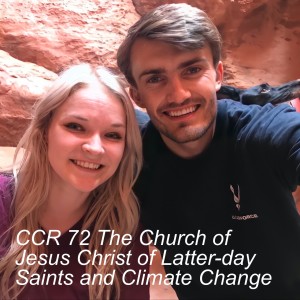
Thursday May 26, 2022
CCR 72 The Church of Jesus Christ of Latter-day Saints and Climate Change
Thursday May 26, 2022
Thursday May 26, 2022
In today’s show we hear from Conservatives who are concerned about climate change. Not only are they concerned, they are engaged in meaningful action. Hannah Rogers, Trevor Jones, and Kaleb Christensen are three young people with ties to the State of Utah who are part of a growing movement in that State. They are each members of the Church of Jesus Christ of Latter-Day Saints. Fusing faith, hope, love for humanity and all nature, these young Conservative Christians are finding their places in the climate movement.
People of faith play a vital role in talking about the causes and impacts of climate change. They also are an essential part of the growing group of citizens and leaders stepping up to propose and pursue solutions. Our guests tell us about their faith and what motivates them to pursue Conservative climate solutions. They also reveal what they bring to the climate movement and why it is essential that they have a seat at the table.
To some they may seem like outliers, Conservatives concerned about climate change. According to a recent Gallup poll of Republican and right-leaning people ages 18-29 reveal that almost two thirds of them acknowledge climate change is caused by humans. Many of these young Conservatives are concerned about this. Older Conservatives though are not on the same page. And Progressives can be dismissive of Conservatives in the climate movement. Hannah, Trevor, and Kaleb believe the LDS Church has a unique role to play in the Republican party and the Conservative movement.
The Art House
You will learn about The Cli-Fi Imaginarium. A group of climate advocates in the UK were tired of so much talk about dreadful climate impacts, and not enough conversations and resources that address actual solutions. They decided that they are over dystopia. Using some of the solutions outlined in Project Drawdown, they organize free monthly on-line workshops for anyone to come and they imagine, What if? In these Intro to Cli-Fi Workshops, they ask, What if we incorporated one of these solutions? How will the world change? How will the neighborhood change?
Some of the topics include District Heating, Tree Intercropping, Refrigeration, Reducing food waste, Alternative Cement, Tidal energy, and solar thermal water. While attending one of the Intro to Cli-Fi Workshops, Citizens Climate Radio’s host, Peterson Toscano, was surprised to see how such wonky solutions inspired engaging creative writing.
Anyone who attends the workshop is eligible to submit a story to the Cli-Fi Imaginarium.
This is a storehouse of creative, inspiring, and sometimes very funny stories all envisioning a world filled with practical and highly effective climate solutions. If you need a shot of inspiration and a positive vision of our future, visit The Cli-Fi Imaginarium.
You can hear standalone versions of The Art House at Artists and Climate Change.
Good News Report
Our Good News Story today comes from Nate Abercrombie, Conservative Outreach Coordinator for Citizens Climate. He has good news to share with us about a recent event that brought Conservatives from all over the country to Washington, DC to talk about climate solutions. The event was a huge success.
In other Good News, Eric Fine, the group leader of the CCL chapter in Greater New Haven, CT told us about a new limited series podcast all about carbon pricing. We hear from Casey Pickett and Naomi Shimberg, hosts of Pricing Nature. They tell us about the show and share some of the conversations they are having.
If you have good news you want to share on the show, or if you have an idea for the art house, email Peterson. Radio @ CitizensClimate.org. Or leave a message our NEW listener voicemail (619) 512-9646
Connect with other listeners, suggest program ideas, and respond to episodes in the Citizens’ Climate Radio Facebook group or on Twitter at @CitizensCRadio.
You can hear Citizens’ Climate Radio on:
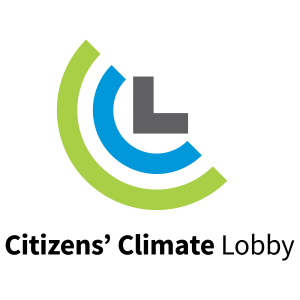
Thursday Apr 28, 2022
CCR 71 Pets, African Wildlife, and Climate Change
Thursday Apr 28, 2022
Thursday Apr 28, 2022
In this episode you will hear a lively conversation between our host, Peterson Toscano, and four South African veterinarians. Like many climate advocates, Peterson couldn’t help himself, and asked Kristine and Roy Page along with their friends and fellow veterinarians Adrian and Ashleigh Tordiffe about climate change in South Africa and how it is affecting household pets and wild animals.
The conversation is rich, informed, and at times hilarious. You will learn about pets in South Africa, and about the many ways animal lovers everywhere can protect their pets from extreme heat, extreme cold, and vector-born illness spread by fleas and ticks. You will hear about the North American ticks that strikes fear in the hearts of all meat-loving South Africans.
Adrian is an academic and researches wildlife populations, and tells us about the adorable and very loud bush baby (also known as galago.) It is one of the very few nocturnal primate, and has two completely diets. In the rainy season it eats fruits and insects, and in the dry month it consumes plant gums produced by certain trees. Twice a year it has to completely transform its digestion system to accommodate its diet.
In addition to demonstrating the signature shrieking sounds the bush baby makes from high up in the trees, Adrian also tells us about how extreme heat and extended drought is making life harder for these amazing creatures.
Join Peterson for a beautiful summer day braai, on the back stoop of Roy and Kristine’s home, as their many dogs roam around and the children play nearby. Joining the four veterinarians is Glen Retief, Peterson’s husband, who grew up among wildlife in South Africa’s Kruger National Park.
The Art House
Krista Hiser is back with another installment of The Ultimate Cli-Fi Book Club. Every few months Krista Hiser shares with us her thoughts about climate-themed literature. This episode Krista looks at the 2010 satirical novel Solar by Ian McEwan.
Michael Beard is a Nobel prize–winning physicist whose best work is behind him. Trading on his reputation, he speaks for enormous fees, lends his name to the letterheads of renowned scientific institutions, and half-heartedly heads a government-backed initiative tackling global warming. While he coasts along in his professional life, Michael’s personal life is another matter entirely. His fifth marriage is crumbling under the weight of his infidelities. But this time the tables are turned: His wife is having an affair, and Michael realizes he is still in love with her.
When Michael’s personal and professional lives begin to intersect in unexpected ways, an opportunity presents itself in the guise of an invitation to travel to New Mexico. Here is a chance for him to extricate himself from his marital problems, reinvigorate his career, and very possibly save the world from environmental disaster. Can a man who has made a mess of his life clean up the messes of humanity? (Goodreads)
Krista is also responding to a hard-hitting research paper Through the Eye of a Needle: An Eco-Heterodox Perspective on the Renewable Energy Transition by Megan K. Seibert and William E. Rees.
Abstract: This analysis makes clear that the pat notion of “affordable clean energy” views the world through a narrow keyhole that is blind to innumerable economic, ecological, and social costs. These undesirable “externalities” can no longer be ignored. To achieve sustainability and salvage civilization, society must embark on a planned, cooperative descent from an extreme state of overshoot in just a decade or two. While it might be easier for the proverbial camel to pass through the eye of a needle than for global society to succeed in this endeavor, history is replete with stellar achievements that have arisen only from a dogged pursuit of the seemingly impossible
This research reveals just how tricky it is to take on climate change. It is a wicked problem with many moving parts we often do not want to see or acknowledge, but Krista encourages us to see the problems in their fullness so we respond with significant and effective solutions.
Dr. Krista Hiser is Sustainability Curriculum Coordinator for the University of Hawaii Office of Sustainability, where she facilitates change management, interdisciplinary dialogue, and professional development opportunities for faculty to design, update and transform courses to integrate sustainability across the curriculum. She serves on the advisory board for the Sustainability Curriculum Consortium (SCC) and on the Steering Committee for the Association for the Advancement of Sustainability in Higher Education (AASHE).
You can read a written version of Krista’s essay at The Ultimate Cli-Fi Book Club for Sustainability in Higher Education.
You can hear standalone versions of The Art House at Artists and Climate Change.
Good News Report
Our good news report comes from State College, PA, the home of Penn State University.
CCL volunteer Dick Jones and the State College CCL chapter is pleased to report that State College Bureau Council unanimously passed a resolution calling on congress to pass Energy and Innovation Act. It is one of over 100 city councils to pass such a resolution including Allentown, Bethlehem, Harrisburg, Pittsburgh, and York, PA.
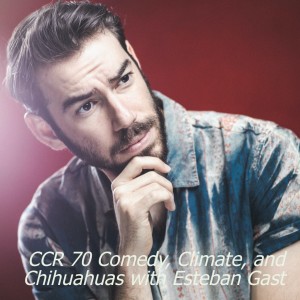
Thursday Mar 24, 2022
CCR 70 Comedy, Climate, and Chihuahuas with Esteban Gast
Thursday Mar 24, 2022
Thursday Mar 24, 2022
Even when he is being serious, comedian, storyteller, and podcast host, Esteban Gast is hilarious. And for climate advocates looking for some hope, perhaps the sweetest spot in the climate change podcast scene right now is Esteban’s new show, Comedians Conquering Climate Change. Only 15 minutes each episode, he features fellow comedians who learn along with the listener. The show is made in collaboration with Generation180.
Comedians Conquering Climate Change is the funniest, friendliest, and shortest podcast addressing today’s critical climate and clean energy topics. Join comedian, writer, and teacher Esteban Gast as he enlists the help of fellow comedians to single-handedly save the planet.
Esteban joins Citizens Climate Radio host, Peterson Toscano, for a lively conversation about the podcast, Esteban’s personal journey into climate communication, and creative ways to engage people who are aware of climate change but do not know where to start. You will also hear excerpts from Esteban’s podcast.
You will laugh, learn, and feel more connected to others taking on climate change.
The Art House
Inspired by Esteban’s comic storytelling, Peterson Toscano shares his own comic story as he grapples with The Weight of Carbon Dioxide and Chihuahuas. He even tries to figure it all out by using his limited math skills, which may be a mistake. How many chihuahua does it take to make a gallon of gasoline? And how can we help people see what is invisible? His math might be a little off, but when it comes to putting a price on carbon, Peterson makes total sense!
You can hear standalone versions of The Art House at Artists and Climate Change.
Good News Report
Lori Byron a co-chair of the Citizens Climate Health Team,The team has hundreds of CCL health care professionals, along with Robert Byron and Lisa Delbuono. Lori serves the point person between the American Academy of Pediatrics and the AAP Chapter Climate Advocates.
If you have good news you want to share on the show, or if you have an idea for the art house, email Peterson. Radio @ CitizensClimate.org.
Or leave a message our NEW listener voicemail (619) 512-9646
You can hear Citizens’ Climate Radio on:
Connect with other listeners, suggest program ideas, and respond to episode in the Citizens’ Climate Radio Facebook group or on Twitter at @CitizensCRadio.
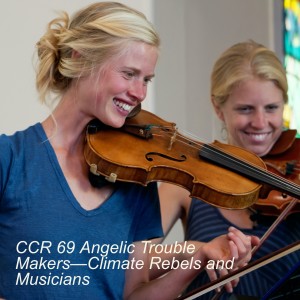
Thursday Feb 24, 2022
CCR 69 Angelic Trouble Makers—Climate Rebels and Musicians
Thursday Feb 24, 2022
Thursday Feb 24, 2022
In episode Episode 9, Quaker activist Eileen Flannagan told us about four roles change agents can play. Advocate, Rebel, Organizer, and Helper. Most of you who listen to Citizens Climate Radio are advocates volunteering your time trying to convince the public and members of congress that we need a price on carbon. You approach congressional members and staff with respect and cordiality as you educate and persuade them to support climate solutions.
And the rebel? The rebel exists to put pressure on those lawmakers to get them to act.
This doesn’t mean we all need to use these rebel tactics.
As Bayard Rustin, the Black Gay Civile Rights leader said,
“We need, in every community, a group of angelic troublemakers.”
In this episode you will hear about UK-based climate change rebel, Caroline Harmon and the non-violent and very disruptive direct actions she and Christian Climate Action use. From kneeling for prayer and halting traffic in front of the Prime Ministers’s residence at 10 Downing Street to holding a worship service outside a coal. They even helped shut down bridges all over London.
From a Christian Pentecostal background, as a child she thought, “For God so loved the world…” a famous passage from John 3:16 meant that God loved the people so much so he sent his sons to save them. As a young adult though someone challenged her to think more expansively. God loves ALL the world including all of the living things on it and the rocks, air, and water. That inspired her to lower her carbon footprint, write letters to members of Parliament, lobby large companies, and contribute to awareness campaigns. For Caroline and some other fellow Christians, that was just not enough.
Hearing Caroline’s story will affirm you in your own climate work while giving you greater appreciation for rebel activists who are playing a vital part that will help us as we seek to have a seat at the table with decision makers.
You can hear and read about personal stories of Christian Climate Action activists in action and talking about why they do what they do, the successes they have had, and what they hope to change.
The Art House
Regular listeners know we feature artists who are using their art to explore climate change. This is an emerging field. Some artists are grappling with just how to integrate climate work into their works of art. Today we feature Sophie and Josies Davis, sisters who grew up on the Coast of Maine who after studying classical violin at conservatory, they are back in Maine. They seek to fuse their love of music and the natural world along with their growing concern for climate change.
Founding members of Halcyon String Quartet based in Maine, USA, they choose to be good citizens as they remain faithful to their art. In speaking with them, we identified six principles for artists addressing climate change might find helpful.
- Know your Stuff (both your craft as an artist and essentials of climate change messaging.)
- Think Locally
- Pursue Collaboration (To date Halcyon String Quartets most successful collaboration was with visual artist Jill Pelto.)
- Pivot to Solutions (Focus less on the many horrible impacts of climate change and instead help your audience experience the future with the beneficial impacts of climate solutions in place.)
- Promote Action (As Katie Patricks, the author of the book and podcast How to Save the World stressed for us on Citizens Climate Radio episode 61—Artists and event organizers have to find ways to offer people the next meaningful step for themselves and their communities.
- Remain Faithful to the Art (Halcyon seeks to straddle the balance between the old time favorites audiences love and new music, music by Black, Indigenous, and people of color. Excellence is the art is essential as they seek to help the public engage in good art and effective climate change discourse.)
About Sophie and Josie
Sophie received degrees in violin performance and environmental studies from Oberlin College and Conservatory. Playing and sharing music are integral to Sophie’s creative and professional practice. She has performed on NPR's "From the Top," at the Kennedy Center, Chicago’s Symphony Hall, the Monte Music Festival in India, and with the Jordan National Orchestra (JOrchestra) in Amman, Jordan. In 2017, Sophie was awarded a Fulbright Research Grant to spend nine months in the South Pacific island nation of Samoa where she explored the ways in which the arts can raise awareness of climate change. In addition to pursuing research, Sophie taught and performed with the National Orchestra of Samoa. Sophie divides her time between musical performance and pedagogy. She serves as violin faculty and chamber music coordinator at Bay Chamber Music School in Rockport and is the co-founder and Artistic Director of Halcyon – an ensemble dedicated to using music and art to cultivate environmental stewardship.
Josie Davis received her undergraduate degrees in violin and sociology at Oberlin College and Conservatory where she was a student of David Bowlin, and her Ed.M from Harvard University. She has performed in a wide-range of venues from Carnegie Hall to the Monte Music Festival in India and has appeared with her sister on NPR’s From the Top. She actively explores ways to share classical music in new contexts and has performed chamber music with Emanuel Ax in a taco shop, played solo Bach for Chris Thile, and is currently a member of Palaver Strings. Her teaching has brought her to Panama, India and Community MusicWorks in Rhode Island where she completed a two-year Fellowship. In past summers, she has studied at the Juilliard String Quartet Seminar, Bowdoin International Music Festival and Kneisel Hall Chamber Music Festival. She is committed to creating more chamber music opportunities for young people and is the founder and director of summer workshops for young people in Maine and Connecticut. As a violinist, educator and arts administrator, Josie is interested in how the arts can be used as a form of cultural empowerment to build bridges and strengthen communities.
You can hear standalone versions of The Art House at Artists and Climate Change.
Good News Report
We do not have a Good News story to share because we had so much to share from Caroline, Josie, and Sophie. We would LOVE to share good news from your own climate work or a breakthrough your group recently had.
If you have good news you want to share on the show, email me. Radio @ CitizensClimate.org. That Radio @Citizens Climate.org
You can hear Citizens’ Climate Radio on:
If you have an idea about the Art House or any other part of our show, feel free to email Peterson at @Citizens Climate.org
Also, feel free to connect with other listeners, suggest program ideas, and respond to episode in the Citizens’ Climate Radio Facebook group or on Twitter at @CitizensCRadio.
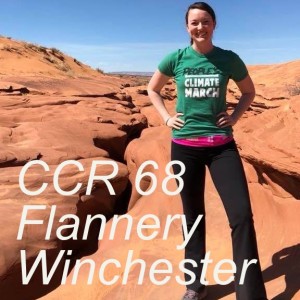
Thursday Jan 27, 2022
CCR 68 An English Major’s Unexpected Journey into Creative Climate Advocacy
Thursday Jan 27, 2022
Thursday Jan 27, 2022
Deciding what one wants to do and be in life has often been hard for young people in high school and college. Now with a global pandemic in a time of climate change, it is more difficult than ever to answer the questions, What do you want to be when you grow up?
Many graduation speeches exhort us to Pursue our Passions, and many a parent worry that such a pursuit will lead their child into a jobless future.
Flannery Winchester was not put off by the concerns of others. She wanted to study English literature. She had no idea her skills and passion would lead her to taking on a national role in communicating to people about climate change.
As Citizens Climate Lobby’s Communications Director, Flannery Winchester trains and supports volunteers to publish written pieces in local media, appear on TV and radio. She also pitches national media, manages and edits the CCL blog, and keeps our volunteers informed and inspired through social media and regular newsletters.
Flannery came to CCL after content and marketing roles at an email marketing agency, an international software company, and a local women’s magazine in Atlanta. She began volunteering with CCL in 2015 and joined the communications department in 2017. When she’s not working, she’s probably gardening, reading, or spending time outside with her dogs.
The Art House
Krista Hiser is back with another instalment of the Ultimate Cli-Fi Book Club. This time she looks at a book that hits very close to home. She dives into the Pandemic and climate change in Emily St. John Mandel’s novel, Stations Eleven.
You can hear standalone versions of The Art House at Artists and Climate Change
Good News Report
Dr. Anthony Leiserowitz, and this is Climate Connections shares good news. Electric trucks could save lives: Pollution from diesel trucks is associated with health problems, and it disproportionately harms low-income people and communities of color.
You can hear Citizens’ Climate Radio on:
Also, feel free to connect with other listeners, suggest program ideas, and respond to programs in the Citizens’ Climate Radio Facebook group or on Twitter at @CitizensCRadio.
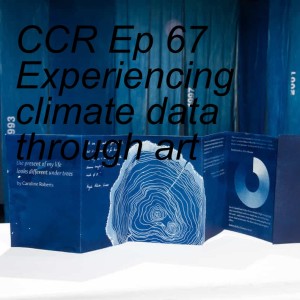
Monday Dec 20, 2021
CCR Ep 67 Experiencing climate data through art
Monday Dec 20, 2021
Monday Dec 20, 2021
Citizens’ Climate Radio is a monthly podcast hosted by CCLer Peterson Toscano. Browse all our past episode recaps here, or listen to past episodes here, and check out the latest episode in the post below.
How can we help the public embrace the science that reveals our climate has been changing dramatically and very quickly? And more than that, how do we make them feel and experience the data so profoundly that it causes them to respond?
These are the questions UK-born artist Caroline Roberts brings to this month’s episode of Citizens’ Climate Radio, and to her art installation, the present of my life looks different under trees. This piece is an immersive installation of cyanotypes that has been exhibited at BOX13 ArtSpace and HCC Southwest in Houston, TX.
Originally from the UK, Caroline moved to Houston, Texas, 18 years ago. She explains that a story about drowned forest thousands of years ago in the UK, along with recent flooding in her city, inspires and informs her artistic work.
“The installation consists of 60 11-feet high panels, each one representing a year of Houston weather data and encircling the Back BOX like a grove of trees. Each varies in width based on the rainfall intensity, as measured by the number of days on which the total rainfall was greater than three inches: the point at which street flooding occurs. The panel color, from ice-blue to blue-black, represents the average nighttime temperature for that year. At first glance the immersive nature of this cyanotype installation provides a cool environment as Houston temperatures fall into autumn. However, a closer look gives the bigger picture: more shocking than any graph, this forest-like environment shows the story of rising temperatures and intensifying rain events.”
While Caroline started her career as a chemical engineer with the faith that science would save the environment, she soon realized that many fields and talents could contribute to environmental advocacy.
Caroline has always relied on science, and after crunching the numbers about the future of the country’s coastline due to climate-related flooding, she found herself in a state of horror and shock for weeks.
Caroline wanted people’s jaws to drop when they saw her art, which visualizes the overwhelming information she has seen predicted for the near future. As environmental conditions over time have grown worse, her installation’s fabric coincides, growing heavy and darker and colder as the fabric winds through history and to the present.
Caroline says that viewers were “gobsmacked” by her forest of fabric, and hopes that all who see her piece will contemplate the view of their own life under trees.
For more information on the data behind this installation please continue to the story and data page.
The Art House
For this month’s segment, you will hear a dramatic reading of Kamil Haque’s play, “Confessions of the Little Match Girl to the Star.” Kamil explains that in creating this piece, he chose to fracture a fairy tale, a nursery rhyme and the calling out to one’s “mama.” These common symbols of innocence form the spine of the play.
To create the heart and soul of this piece, Kamil examined and extracted pieces from the transcripts of Greta Thunberg’s 2019 U.N.'s Climate Action Summit and George Floyd’s final moments in 2020. Through these channels he explores how two people on opposite ends of the age and racial spectrum express grief and anguish at their circumstances. How might their spirit and the spirit of their message live on literally and metaphorically?
“Confessions of the Little Match Girl to the Star” was performed at The BTS Center’s Climate Change Theatre Action 2021 event. It is read by Dr. Natasha DeJarnett, a public health expert and the chair of Citizens’ Climate Education board.
You can hear standalone versions of The Art House at Artists and Climate Change.
Good News Report
Our good news story this month comes from Solemi Herandez, the Southeast coordinator for Citizens’ Climate Lobby. She tells us about her experiences at COP26 and shares good news about Climate Empowerment Article 12 of the Paris agreement. Solemi is hopeful for the future because of the involvement that she saw at COP26, and is hoping that more citizens will get engaged in climate work.
We always welcome your thoughts, questions, suggestions, good news, and recommendations for the show. Leave a voice mail at (518) 595-9414 (+1 if calling from outside the USA). You can email your answers to radio @ citizensclimate.org.
You can hear Citizens’ Climate Radio on:
Also, feel free to connect with other listeners, suggest program ideas, and respond to programs in the Citizens’ Climate Radio Facebook group or on Twitter at @CitizensCRadio.
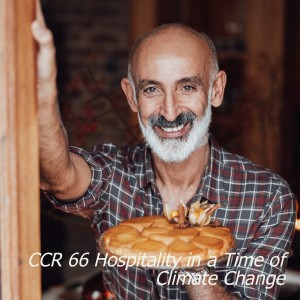
Tuesday Nov 23, 2021
CCR 66 Hospitality in a Time of Climate Change
Tuesday Nov 23, 2021
Tuesday Nov 23, 2021
We live in a world with stronger and more frequent extreme weather events. As a result, giving and receiving hospitality is becoming the new normal for humans. Citizens’ Climate Radio host Peterson Toscano speaks with public theologian Jayme R. Reaves and public health expert Dr. Natasha DeJarnett. What are the risks leading to more displacement? What are the dilemmas and challenges of housing, feeding, and creating more space for people uprooted from homes during extreme weather? And what are some of the creative ways communities provide protection to those temporarily or permanently unhoused?
Jayme R. Reaves is the director of academic development at Sarum College in Salisbury, England. She teaches in areas such as biblical studies, and feminist and liberation theology. Over the last 20 years, she has worked as a consultant, researcher, lecturer, and facilitator in the U.S., former Yugoslavia, Northern Ireland, and Great Britain. Her focus internationally has been on the intersections between theology and public issues such as peace, conflict, hospitality, memory, and gender.
Jayme discusses the roles that scarcity and abundance play in making sure that those most impacted by the environment in the community around us are cared for. She calls on churches to work in their own communities to make congregations aware of sharing with those who don’t have as much.
Jayme regularly speaks, leads retreats, conducts workshops, and acts as “theologian in residence” with communities who wish to dive deeper into understanding theological frameworks for social justice activism. She's the author of Safeguarding the Stranger: An Abrahamic Theology & Ethic of Protective Hospitality (Wipf & Stock, 2016) and co-editor of When Did We See You Naked?: Jesus as a Victim of Sexual Abuse (SCM, 2021).
Additionally, she co-hosts the podcast Outlander Soul, which looks at the Outlander series by Diana Gabaldon with a theological, religious, and spiritual lens and takes seriously the role fiction plays in fans’ lives as a sacred text. Jayme lives in Dorset, England with her partner and two dogs.
Dr. Natasha DeJarnett is an assistant professor in the Christina Lee Brown Environment Institute at the University of Louisville Division of Environmental Medicine, researching the health impacts of extreme heat exposure and environmental health disparities. Additionally, she is a professorial lecturer in Environmental and Occupational Health at the George Washington University Milken Institute School of Public Health. Previously, Dr. DeJarnett was the interim associate director of Program and Partnership Development at the National Environmental Health Association, leading research, climate and health, and children’s environmental health.
She also previously served as a policy analyst at the American Public Health Association (APHA), where she led the Natural Environment portfolio, including air and water exposures along with climate change. Dr. DeJarnett is a member of the EPA’s Children’s Health Protection Advisory Committee, is chair of the Governing Board of Citizens’ Climate Education, a member of the Board of Directors of Physicians for Social Responsibility, chair-elect for APHA’s Environment Section, member of the Advisory Board of APHA’s Center for Climate, Health and Equity, a member of the Board of Trustees for the BTS Center, special advisor to the Environmental Health and Equity Collaborative, and the Steering Committee of the International Transformational Resilience Coalition.
Dr. DeJarnett emphasizes that more than ever before, people are being displaced as a result of severe weather phenomena caused by climate change. In 2018, 16 million people were displaced due to climate, 1.2 million of which were American. She points out that in 2020, more hurricanes and tropical storms made landfall than ever before, to the point where letters in the Greek alphabet were being used to name them, as the list of hurricane names had been used up. Dr. DeJarnett says that church communities are presented with the opportunity to provide hospitality more than ever by turning churches into cooling centers, and by educating the community about staying safe through weather phenomena.
To learn more about building community resilience see the US Climate Resilience Toolkit or see how you can get involved with establishing a local or regional Climate Resilience Hub.
The Art House
Joining us in the Art House is Dr. Krista Hiser with The Ultimate Cli-Fi Book Club. The purpose of the book club is to look at climate-themed literature and consider how it can help us engage differently with interdisciplinary topics and existential threats related to the planetary predicament of climate change.
In this episode, Krista reflects on Deena Metzger’s novel A Rain of Night Birds.
Dr. Krista Hiser is Professor at Kapiʻolani Community College. Her Ph.D. is in Educational Administration from the University of Hawai‘i at Mānoa. She has published works on community engagement, service-learning, organizational change, post-apocalyptic and cli-fi literature.
In this month’s episode, Krista tells us that the protagonist of “A Rain of Night Birds” is a scientist that also relies on feeling to gauge the environmental phenomena around her. With themes of spiritualism and indigenous culture, this “literature of restoration” focuses on the concept of doing no harm, based on the importance of the world around us.
You can read a written version of Krista’s essay at The Ultimate Cli-Fi Book Club for Sustainability in Higher Education on Medium. You can hear standalone versions of The Art House at Artists and Climate Change.
Good News Report
Our good news comes from Anthony Leiserowitz at Yale Climate Connections. In tune with the theme of hospitality, Anthony discusses a disaster resiliency program geared toward Spanish-speaking residents in Sonoma County, California.
Whether people lose power or work as a result of climate and weather disasters, many nonprofits are developing plans and guides to help Spanish speakers in the west prepare. These programs help residents sign up for emergency alerts, prepare for emergencies, and make financial arrangements needed to safely leave during severe weather.
We always welcome your thoughts, questions, suggestions, good news, and recommendations for the show. Leave a voicemail at (518) 595-9414 (+1 if calling from outside the U.S.). You can email your answers to radio @ citizensclimate.org
You can hear Citizens’ Climate Radio on iTunes, Spotify, Stitcher Radio, SoundCloud, Podbean, Northern Spirit Radio, Google Play, PlayerFM, and TuneIn Radio. Also, feel free to connect with other listeners, suggest program ideas, and respond to programs in the Citizens’ Climate Radio Facebook group or on Twitter at @CitizensCRadio.
Photo by furkanfdemir from Pexels
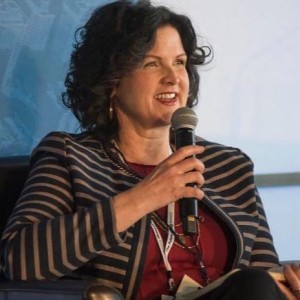
Thursday Oct 21, 2021
CCR 65 Extreme Heat and Insurance Solutions with Kathy Baughman McLeod
Thursday Oct 21, 2021
Thursday Oct 21, 2021
Kathy Baughman McLeod, SVP, Atlantic Council & Director, Adrienne Arsht - Rockefeller Foundation Resilience Center reveals the many risks that come with extreme heat. She also provides multiple solutions, including innovative ways to use insurance to change the way we build and respond to extreme weather.
Kathy Baughman McLeod leads the Center’s work to reach one billion people worldwide with climate resilience solutions by 2030. She also chairs the Extreme Heat Resilience Alliance which partners with climate-forward Mayors around the world to appoint Chief Heat Officers. Additionally, Kathy is spearheading the global push to name and categorize heat waves. She was formerly Global Executive for Environmental and Social Risk at Bank of America, Managing Director for Climate Risk & Resilience at The Nature Conservancy, and a Florida Climate Commissioner. She is the recipient of the Duke University Fuqua School of Business 2021 “Leader of Consequence” award.
Learn more about Kathy and her work to reach one billion people with climate solutions by visiting One Billion Resilient. Follow Kathy on Twitter.
Articles by Kathy Baughman McLeod and others about responding to extreme heat.
Foreign Affairs’ “Building a Resilient Planet,” Marketplace’s “How the U.S. could be smarter about insuring against extreme weather-related disasters,” The Financial Times’ “Cities Appoint ‘Heat Officers’ In Response to Warming Threat,” The New Yorker’s “Oil’s Bad, Bad Day,” The Climate Pod’s “How Do We Live with Hotter ‘Climate Normals’?,” Reuter’s “U.S. Cities Hire specialists to counter climate change as impacts worsen,” and Fast Company’s “Athens will be the first European city to appoint a Chief Heat Officer.”bHeat is Killing Us and The Economy Too The Atlantic Council
The Art House
Joining us in the Art House is Marissa Slaven. In 2019 we featured her in Episode 33 to talk about her young adult climate themed novel, Code Blue. Now Marissa is back with the squeal, Code Red. She was inspired by her daughter to write this series of eco-fiction thriller, where a teenage girl and her friends battle climate change. I sat down with her to talk about the new book and to hear her read an excerpt. To learn more about Marissa and her books, visit Stormbird Press. You can also follow her on Twitter.
You can hear standalone versions of The Art House at Artists and Climate Change
Good News Report
Our good news story this month comes from Flannery Winchester, communications director at Citizens Climate Lobby. Because of the many efforts by CCL volunteers, the needle is moving towards carbon fee and dividend as one of the ways to address climate change. She talks about the budget reconciliation process and volunteer lobbying and how politicians and the press are responding.
We always welcome your thoughts, questions, suggestions, good news, and recommendations for the show. Leave a voice mail at 518.595.9414. (+1 if calling from outside the USA.) You can email your answers to radio @ citizensclimate.org
You can hear Citizens’ Climate Radio on iTunes, Spotify, Stitcher Radio, SoundCloud, Podbean, Northern Spirit Radio, Google Play, PlayerFM, and TuneIn Radio. Also, feel free to connect with other listeners, suggest program ideas, and respond to programs in the Citizens’ Climate Radio Facebook group or on Twitter at @CitizensCRadio.
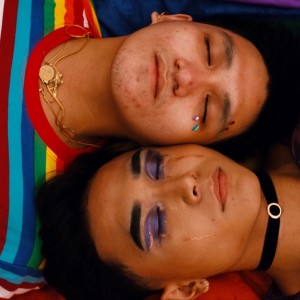
Friday Sep 24, 2021
CCR Ep 64 Hinduism and LGBTQ climate work with Hari Venkatachalam
Friday Sep 24, 2021
Friday Sep 24, 2021
How does an American Hindu approach the climate crisis? What ancient values and teachings apply to modern life in America today? And how does this relate to LGBTQ issues and public health? Hari Venkatachalam connects his faith, work, heritage, and even his sexual orientation to living in a climate-changed world.
In the episode Hari reveals how extreme weather, which affects everyone, disproportionally impacts LGBTQ homeless youth. Citizens Climate Radio host, Peterson Toscano, explains,
Up to 40% of youth living on the streets in the United States and Canada are lesbian, gay, bisexual, transgender, and non-binary. Many of them avoid going to shelters because they assume they will received the same discrimination and hostility they escaped. This is especially true for transgender and gender non-binary young people. This puts them at extra risk during extreme weather events.
Hari Venkatachalam also talks about his faith and the principles handed down to him from his father. Hari is an active member of Sadhana: A Coalition of Progressive Hindus, and his activism focuses on environmental justice, LGBTQ+ issues, and public health. He currently works in Tampa, Florida as a public health researcher for the Department of Veterans Affairs.
Kathy Baughman McLeod, SVP, Atlantic Council & Director, Adrienne Arsht - Rockefeller Foundation Resilience Center, also weighs in to talk about the dangers of extreme heat.
The Art House
Joining us in the Art House is Dr. Krista Hiser, with the first in a series of an occasional feature called The Ultimate Cli-Fi Book cCub. The purpose of the book club is to look at climate-themed literature and consider how it can help us engage differently with interdisciplinary topics and existential threats related to the planetary predicament of climate change.
In this episode Krista reflects on the cli-fi novel, Blaze Island by Catherine Bush, and lets her imagination run wild, as she pulls together some of the greatest minds in climate fiction.
Dr. Krista Hiser is Professor at Kapiʻolani Community College. Her PhD is in Educational Administration from the University of Hawai‘i at Mānoa. She has published on community engagement, service-learning, organizational change, post-apocalyptic and cli-fi literature.
You can read a written version of Krista’s essay at The Ultimate Cli-Fi Book Club for Sustainability in Higher Education on Medium.
You can hear standalone versions of The Art House at Artists and Climate Change
Good News Report
Our good news comes from Anthony Leiserowitz at Yale Climate Connections. You will hear about a new fund which aims to bring more people into the climate conversation.
We always welcome your thoughts, questions, suggestions, good news, and recommendations for the show. Leave a voice mail at 518.595.9414. (+1 if calling from outside the USA.) You can email your answers to radio @ citizensclimate.org
You can hear Citizens’ Climate Radio on iTunes, Spotify, Stitcher Radio, SoundCloud, Podbean, Northern Spirit Radio, Google Play, PlayerFM, and TuneIn Radio. Also, feel free to connect with other listeners, suggest program ideas, and respond to programs in the Citizens’ Climate Radio Facebook group or on Twitter at @CitizensCRadio.

